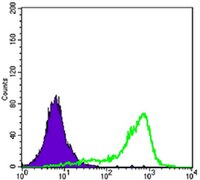MABC691 Sigma-AldrichAnti-CRTC1 Antibody, clone 1B5
Detect CREB-regulated transcription coactivator 2 using this mouse monoclonal antibody, Anti-CRTC1 Antibody, clone 1B5 validated for use in western blotting, ICC & Flow Cytometry.
More>> Detect CREB-regulated transcription coactivator 2 using this mouse monoclonal antibody, Anti-CRTC1 Antibody, clone 1B5 validated for use in western blotting, ICC & Flow Cytometry. Less<<Recommended Products
Overview
| Replacement Information |
|---|
Key Spec Table
| Species Reactivity | Key Applications | Host | Format | Antibody Type |
|---|---|---|---|---|
| H | WB, ICC, FC | M | Ascites | Monoclonal Antibody |
| References |
|---|
| Product Information | |
|---|---|
| Format | Ascites |
| Control |
|
| Presentation | Mouse monoclonal IgG1 ascitic fluid containing up to 0.1% sodium azide. |
| Quality Level | MQ100 |
| Physicochemical Information |
|---|
| Dimensions |
|---|
| Materials Information |
|---|
| Toxicological Information |
|---|
| Safety Information according to GHS |
|---|
| Safety Information |
|---|
| Packaging Information | |
|---|---|
| Material Size | 100 µL |
| Transport Information |
|---|
| Supplemental Information |
|---|
| Specifications |
|---|
| Global Trade Item Number | |
|---|---|
| Catalogue Number | GTIN |
| MABC691 | 04053252916410 |
Documentation
Anti-CRTC1 Antibody, clone 1B5 SDS
| Title |
|---|
Anti-CRTC1 Antibody, clone 1B5 Certificates of Analysis
| Title | Lot Number |
|---|---|
| Anti-CRTC1, clone 1B5 | VP1406190 |
| Anti-CRTC1, clone 1B5 - VP1903088 | VP1903088 |









